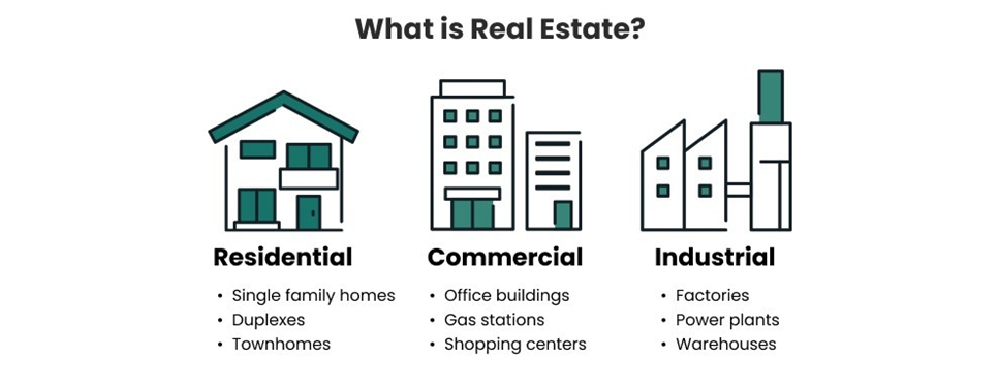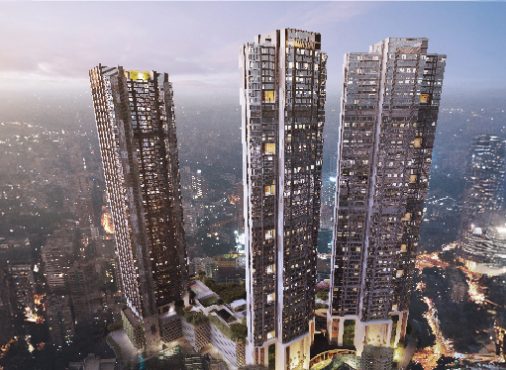Real estate has always been one of the most reliable ways to build wealth, with tangible value, steady returns and growth. For high-net-worth individuals, it’s more than just an investment; it’s a status symbol and a legacy builder.
Generally, real estate can be divided into four main categories: residential, commercial, industrial and land. Each has its unique investment opportunities and understanding the nuances of each can help luxury investors make informed decisions to grow their wealth.
What are the 4 Types of Real Estate?
Real estate is any property or land that can be bought, sold or developed for residential, commercial or industrial purposes. It’s a foundation for financial growth through its dual benefits of rental income and capital appreciation.
Each of the four types of real estate serves a different investment purpose. Here’s how:
-
Residential Real Estate
Residential real estate refers to properties intended for personal living. These include luxury villas, high-end apartments, bungalows, holiday homes, and gated communities. This type of real estate is ideal for investors seeking tangible assets that combine lifestyle and long-term appreciation.
Features and Opportunities
Residential properties are highly customisable, allowing luxury buyers to design homes that reflect their tastes. High-end residential projects often come with bespoke amenities like infinity pools, private cinemas, rooftop lounges, and landscaped gardens. Such properties are often situated in prime locations, providing stunning views and exclusivity.
For instance, a luxury apartment in a development like Rustomjee Crown in Mumbai combines world-class architecture with cutting-edge facilities, offering residents a resort-like living experience.
Benefits for Luxury Investors
- Exclusivity: Properties in prime neighbourhoods such as Bandra or South Mumbai come with prestige and privacy.
- Passive Income: Renting luxury properties to high-income tenants can generate steady income.
- Legacy Building: Residential properties can be passed down through generations, making them a long-term asset.
- Lifestyle Value: Luxury residential real estate goes beyond monetary returns, enhancing the owner’s lifestyle and social status.
Read Also: A Guide to the Best Cafes, Restaurants, and Boutiques in Bandra Pali Hill
-
Commercial Real Estate
Commercial real estate encompasses properties used for business purposes, such as office spaces, shopping malls, luxury retail stores, and co-working hubs. For luxury investors, commercial real estate represents a lucrative source of income and a way to diversify portfolios.
High-Income Potential
Prime commercial properties located in bustling urban areas attract multinational corporations and luxury brands, ensuring a consistent revenue stream. For example, an office space in Bandra Kurla Complex (BKC), Mumbai’s financial hub, guarantees high rental yields due to constant demand from corporates.
Evolving Trends in Commercial Real Estate
- Smart Offices: Commercial spaces with IoT-enabled features, automated lighting, and air quality monitoring are growing in demand.
- Luxury Retail: High-end malls and flagship retail stores in urban centres are catering to premium consumers, driving demand for luxury retail spaces.
- Co-Working Hubs: As hybrid work models gain traction, luxury co-working spaces are integrating comfort with advanced technology.
Benefits for Luxury Investors
- Consistent Rental Income: Commercial leases are typically long-term, offering financial stability.
- High Appreciation Rates: Prime commercial spaces appreciate faster due to their high demand.
- Customisation Opportunities: Investors can tailor spaces for premium tenants, such as luxury brands or high-profile companies.
3. Industrial Real Estate
Industrial real estate may not have the glamour of residential or commercial properties, but it plays a critical role in modern investment portfolios. This category includes warehouses, logistics centres, and manufacturing plants.
Increasing Importance in the Modern Economy
The rise of e-commerce has dramatically increased demand for industrial properties. Companies require vast spaces for storage, order fulfilment, and distribution. As a result, industrial real estate has emerged as a lucrative asset class for investors.
For instance, warehouses near major cities like Mumbai, Pune, and Bengaluru are experiencing high demand due to their proximity to major transport routes.
Benefits for Luxury Investors
- Steady Returns: Industrial leases are typically long-term, offering reliable income.
- Low Maintenance: Compared to residential or commercial properties, industrial spaces require less frequent upgrades.
- High Demand: The rapid expansion of online retail and logistics has created a surge in demand for strategically located warehouses.
Ideal Locations
Urban peripheries and well-connected regions like Navi Mumbai are prime locations for industrial investments. These areas offer ample space for large facilities while ensuring connectivity to transport hubs.
Read Also: Why Bandra Pali Hill is the Preferred Choice for Celebrities and the Elite
4. Land
Land, as an asset class, is the purest form of real estate investment and holds unmatched potential for luxury investors. Unlike built properties, land provides flexibility, exclusivity, and the freedom to create custom developments that align with an investor’s vision. Whether it’s a sprawling estate, a luxury commercial project, or a boutique resort, land offers endless possibilities.
Types of Land Investments for Luxury Buyers
- Undeveloped Land: Undeveloped plots are raw land without infrastructure or zoning restrictions. These parcels offer investors a blank slate to create tailored projects, whether residential, commercial, or mixed-use. The value of such land often appreciates significantly, especially in growing urban and suburban areas.
- Developed Land: These are plots with infrastructure like roads, utilities, and zoning in place. Developed land is often part of gated communities, offering security and immediate development opportunities.
- Agricultural Land: Agricultural land is often converted into residential or commercial spaces as urban areas expand. Investors buy agricultural land at lower rates and convert it for premium use, such as exclusive farmhouses, vineyards, or eco-resorts.
Why Invest in Land?
- Appreciation Potential: Land is a finite resource, and as cities expand, the value of strategically located land appreciates significantly. This is especially true in areas like Mumbai and Pune, where space is limited and demand is high.
- Customisation: Land provides the opportunity to build bespoke projects. Luxury investors can design homes, offices, or mixed-use developments that reflect their personal style and functional needs.
- Exclusivity: Owning large plots of land in prime areas ensures privacy and status. For example, an expansive beachfront property in Alibaug can serve as both a personal retreat and an appreciating asset.
- Low Maintenance Costs: Unlike built properties, land has minimal maintenance requirements, making it a relatively low-cost investment over the long term.
How Luxury Buyers Can Benefit From Real Estate Investments
For high-net-worth individuals, real estate offers unparalleled benefits that go beyond financial returns. Luxury real estate investments provide stability, diversification, and an opportunity to create generational wealth. Here’s a closer look at why real estate remains an indispensable part of luxury portfolios:
-
Stability and Security
Unlike volatile asset classes like stocks or cryptocurrencies, real estate is a tangible and stable investment. Luxury properties, especially in prime locations, retain their value even during economic downturns.
-
Generating Passive Income
Luxury real estate investments, such as high-end apartments or commercial spaces, generate consistent rental income. Tenants in the luxury market are often affluent and sign long-term leases, ensuring reliable cash flow.
- Residential Income: Renting out a premium property can yield high rental returns due to its appeal to expatriates and professionals.
- Commercial Income: Leasing a retail space in an upscale mall attracts luxury brands willing to pay premium rents.
-
Customisation and Personalisation
One of the most significant advantages of real estate is the ability to tailor properties to suit personal or business needs. For example:
- Investors can build bespoke homes with exclusive features like private pools, home theatres, or personal wellness centres.
- Developers can design high-tech offices or co-working spaces that cater to modern business needs.
-
Long-Term Appreciation
Luxury properties in premium locations tend to appreciate faster than other asset classes. Over time, these properties not only preserve wealth but also multiply it.
-
Portfolio Diversification
Investing in real estate allows luxury buyers to diversify their portfolios across residential, commercial, industrial, and land categories. Each type serves different purposes and mitigates risk by spreading investments across varied asset classes.
Conclusion
Real estate remains one of the most reliable and rewarding investment options for luxury buyers, offering financial stability, long-term appreciation, and lifestyle benefits. Whether you’re interested in bespoke residential properties, high-yield commercial spaces, or the flexibility of land investments, each type of real estate presents unique opportunities for growth and prestige.
If you’re ready to explore premium real estate options that redefine luxury, partner with Rustomjee. With a legacy of delivering world-class developments, Rustomjee offers exclusive properties tailored to meet the needs of discerning investors. Visit Rustomjee Properties today to find your next premium investment.
FAQs
- Which type of real estate is best for luxury buyers?
Luxury buyers often prefer residential and commercial real estate. Residential properties, such as luxury villas or apartments, provide exclusivity and personal use. Commercial real estate, like premium retail spaces, offers steady rental income.
- What is the difference between residential and commercial real estate?
Residential real estate is designed for personal living, while commercial is intended for business use. Residential properties offer privacy and lifestyle value, whereas commercial spaces generate higher rental income and attract business tenants.
- How can I start investing in real estate as a luxury buyer?
Define your investment goals and research high-growth markets. Work with reputable developers to explore premium properties. Ensure due diligence with legal and financial advisors to make secure, well-informed decisions that align with your portfolio objectives.








